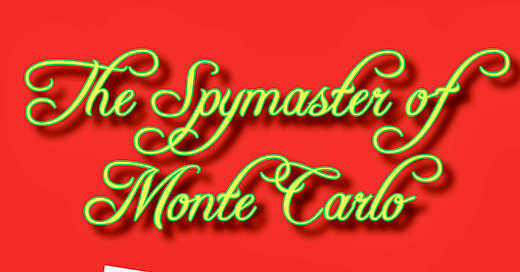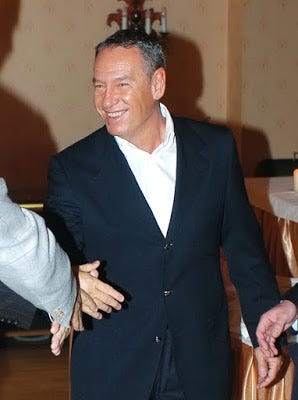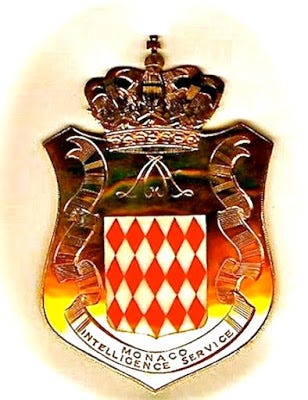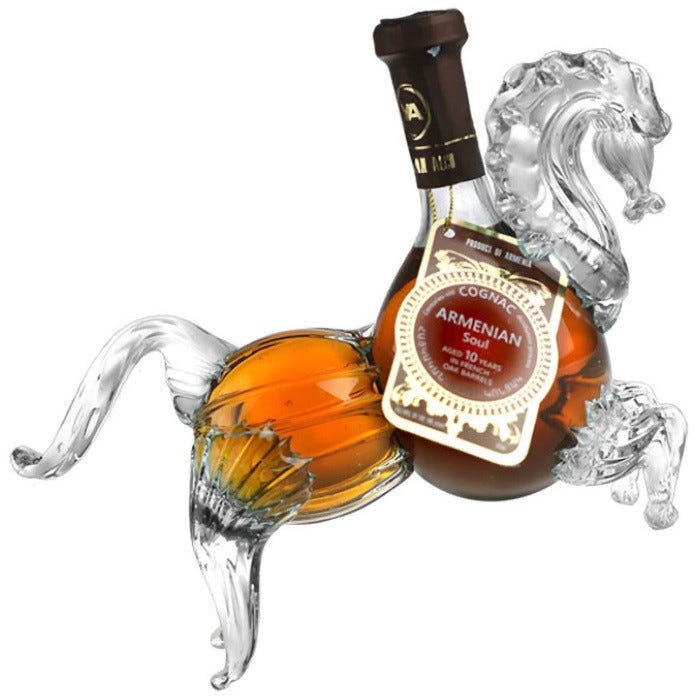THE SPYMASTER OF MONTE CARLO: 27) SPLINTER REDUX
A Throwback Thursday Memoir of Intrigue & Lunacy
September-October 2005
Captain Yves Subraud of SIGER (Monaco Police) had visited MING’s apartment building and spoken with the concierge about the duration of time MING spent in Monaco.
(MING being the retired USAF colonel we suspected of spying for Russia.)
The concierge fudged, saying “five to seven months.”
He was obviously lying (so said Subraud).
Monaco’s foreign residents are known to pay handsome Christmas bonuses to helpful concierges who fudge on such matters. (Residents are requited to spend at least six months of the year in the principality to retain their residency status.)
Subraud had also visited our target Serb’s apartment building, whose concierge reported that he spent "three-to-four months" in Monaco, though his wife and daughter were present full-time.
Regarding Dan Fischer, about whom Prince Albert had requested intelligence:
Although he claimed to be German he was actually Romanian—his real name was Francu.
Lately, Fischer/Francu been ingratiating himself with Monaco’s mayor, Georges Marsan, trying to create a Romania-Bulgaria association in Monaco.
Fischer/Francu had changed his name after moving to Germany, and had lied about his birth and nationality on his application for residency in Monaco.
His residency could be revoked on that basis alone.
Subraud was excited when I told him about Prince Albert’s interest in targeting Jean-Paul Carteron.
Soon after Carteron first arrived in Monaco, Subraud told me, he had scribed a negative report about Carteron. But the interior ministry dropped it down a black hole.
Someone, doubtless, had been paid off.
SPLINTER arrived in town. Having discovered Monaco and met the prince, he now couldn’t stay away.
I'd meant to take this Russian previously identified as Sergey out to a casual dinner of sushi that evening but he took control of the evening and insisted I manifest myself at Hotel Metropole for foie gras, truffles and caviar—and 500-euro bottles of wine (paid for in cash, as always, by his translator/lover Oksana).
And since I'm a trooper, I caved.
A hind-sight reflection here: Damn, I ate and drank well!
On SPLINTER's agenda: a meeting between the Prince Albert and President Putin in Moscow.
This would be a favor to the prince, he added, to “elevate his stature.”
“He’d probably be more interested in meeting the female gymnastic team,” I said, tongue-in-cheek, by this time accustomed to Albert's ways.
My quip was lost on this humorless Russian, who suddenly became paranoid about the number of “Hindus” (persons from India) on the Metropole restaurant’s wait staff.
Their “hovering” bothered him terribly; he thought they were spying on him.
It became a kind of game for me to needle SPLINTER with humor.
“The prince needs a princess,” I’d say. “Choose a dozen of your most beautiful women and I’ll interview them myself.”
(SPLINTER would later respond to my jesting through Ian: “Please tell Robert that Putin will not supply women for the prince.”)
SPLINTER confided that corruption in the Russian government “is now 99%.”
(He implied that he was struggling to remain in the un-corruptible 1%.)
“Anything new on the Serbian?” I asked.
“Why are you so focused on him?”
“What about the Chernoy brothers?”
SPLINTER grew irritated. “Why are you interested? They're not in Monaco.”
“Simon Reuben bought his way back into Monaco, and he connects to the Chernoys,” I replied. “We discussed this in Frankfurt, remember?” (As in, The Reuben Conspiracy.)
SPLINTER waved this topic away, and eructed with an interest of his own: Jean-Paul Carteron—what did we know about him?
“He learned humanitarianism from Papa Doc and Baby Doc Duvalier,” I said. “It goes downhill from there.”
Would I mind sending him a report on Carteron?
Maybe, I said. What about the Serb and the Chernoys?
It went on like this, greased by fine cuisine and superb wine.
Next morning, my birthday began with a visit from LIDDY, who had been busy running traces on Dan Fischer/Francu.
This Romanian was believed to have laundered money in Monaco through buying and selling (at a small loss) $20 million worth of jewelry, part of a Romanian-Bulgarian-Turkish joint effort of organized crime groups to penetrate Western Europe and compete with Italian and Russian organized crime.
Their business was drugs, prostitution and arms trafficking—and laundering money derived from such. Fischer/Francu was said to be liaising with the Turks and Bulgarians on behalf of Romanian organized crime.
In addition to forming an association of these nationalities in Monaco, Fischer/Francu desired to make Monaco the headquarters of a Romanian telecommunications company he owned. To this end, Fischer/Francu was known to be ingratiating himself with Georges Marsan, the mayor of Monaco, and had organized a trip—hosted by ROM Telecom, paid for by Monaco’s police association—for Marsan to visit Bucharest.
Fischer/Francu was known by the police to use women/sex to curry favor with Monaco’s men of influence.
Prince Albert sure knew how to pick the right people for the social orbit of his royal court.
More from LIDDY:
Umar Djabrailov, the Chechen hotelier from Moscow (and suspected murderer of Paul Tatum), had in 2002 been declared persona non grata in Monaco, where his ex-wife and child resided. But after winning a seat in the Duma, Djabrailov was issued a Russian diplomatic passport—and used it to quash the Monaco ban on him.
My next meeting was with a source we had cultivated within ASM, Monaco’s football team.
Without Prince Albert’s permission (as needed), a new football coach had been appointed by the duo running the team—Michel Pastor and his cousin Gerard Brianti—from which Brianti received an illegal kickback.
Our football spy informed us that Monaco Football Investment (MFI), ostensibly a private company, received government funds; that MFI was in fact a Michel Pastor cover for utilizing government money to support Monaco’s football team—in violation of European football league rules.
If exposed, this could have resulted in Monaco’s expulsion from the league.
According to our spy, Prince Albert approved this financial maneuver orally (to Franck Biancheri) and it was being covered up by three persons: Pastor, Brianti, and Biancheri.
(I immediately suspected Biancheri had feigned Albert’s “oral approval,” the same way he allegedly took three million euros from Adnan Houdrouge supposedly destined for the prince.)
HSBC in Monaco, which had loaned money to MFI (said our spy) also loaned 3.5 million euros to Brianti personally “based on nothing” i.e., no collateral.
Brianti had just purchased a new boat, from Chantal in San Lorenzo, Italy, for 3-4 million euros, of which he paid 25 percent in cash, allegedly from football kickbacks.
Meantime, corrupt Italians resident in Monaco were queueing up for Monegasque citizenship, which they considered their immunity from prosecution in Italy.
One such criminal had just received his passport.
Only the Sovereign can approve an application for Monegasque citizenship.
I had already briefed the prince on this particular individual.
Yet despite his undertaking to cleanse Monaco from these kinds of corrupt characters, Albert had signed the application.
SPLINTER insisted on taking me to the Grill Room of the Hotel de Paris for dinner on my birthday.
We had to change tables twice due to a “draft” SPLINTER imagined. And then he loudly complained when a woman seated nearby sneezed into a handkerchief several times.
That evening I saw a different side to him—thoughtful yet talkative (yet ever the hypochondriac).
SPLINTER postured himself as democratic, a believer in God. He expressed disillusionment and unhappiness with Putin and his corrupt cronies in Moscow and St. Petersburg, adding that Putin himself was corrupt.
To get the job of president, said SPLINTER, Putin had been forced to compromise himself by granting deals that had made assorted Russians very, very wealthy; now they blackmailed him and closeted him away from “good” people (such as himself).
Everyone in Moscow was focused on the Putin/crony-get-rich-quick paradigm, he added.
Boris Berezovsky, the exiled oligarch, knew much about the corrupt crony deals that allowed Putin to succeed President Yeltsin, and that was why Putin and his gangsters wanted Berezovsky dead. (At this point, Berezovsky was still alive; I would soon meet him.)
SPLINTER told me that Putin had personally ordered the FSB to poison the Ukrainian President Yuri Luschenko.
SPLINTER suggested that only divine intervention kept him—SPLINTER—safe.
“Why was Yukos Oil targeted by Putin for prosecution and not Lukoil or Sibneft?” I asked.
“They are equally to blame and share guilt,” SPLINTER replied. “It is not fair that Khodokovsky [the Yukos chief] was singled out [and jailed] while the others go free.”
SPLINTER stated that Umar Djabrailov “was responsible for Paul Tatum’s murder—and the murder of others.”
SPLINTER divulged the reason for his interest in Jean-Paul Carteron:
He believed that Carteron, through the Bulgarians, connected to the Chechens (probably by selling arms to the Chechens)—and the Chechens were SPLINTER’s worst nightmare.
According to Ian M (formerly of MI6), SPLINTER had been expecting a promotion.
Was he bitter this hadn’t happened?
Was he angling for recruitment by a Western intelligence service?
Like others, he probably thought I was CIA; maybe it was a provocation to "flush me out."
But with me, he was barking up the wrong tree. I had a singular client: Prince Albert of Monaco. And my small intelligence service could not afford to recruit him.
“I’ve discovered democracy,” he’d said. “But it’s expensive.”
We ate our way through sautéed foie gras, Le Loup, and a Grand Marnier soufflé, climaxed with a 1962 Armagnac.
For my birthday, SPLINTER gifted me a glass horse filled with brandy.
Needless to say, it went un-drunk.







